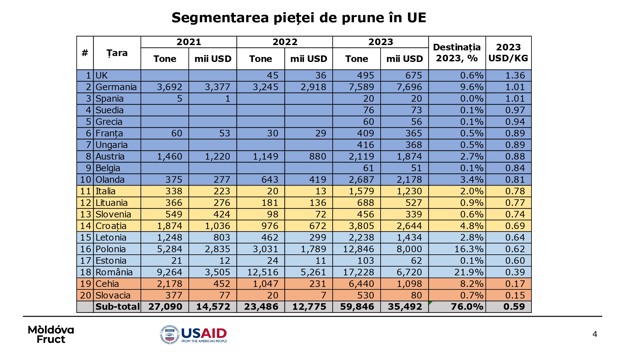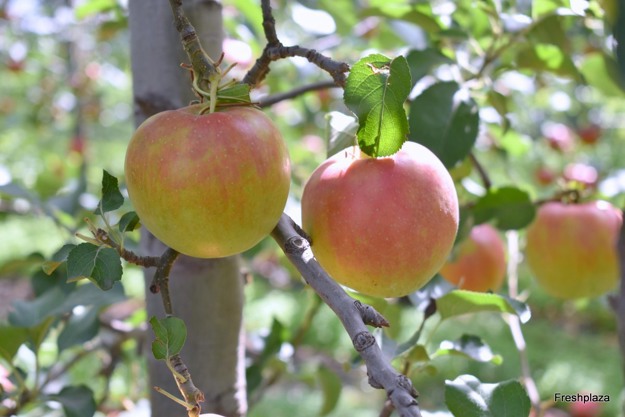The results of Moldova's admission to the European Union - a narrow victory for 'Yes', though Russian interference in the form of buying 300,000 votes is suspected - are known. The first round of the presidential election has also been completed, with current pro-European President Maia Sandu facing pro-Russian Alexandr Stoianoglo in a second round on November 3. It is, thus, an opportune time to end our Moldova series on FreshPlaza. We do so with some general insights about the fruit sector provided by Iurie Fala, CEO of the sector association, Moldova Fruct.
A modern stone fruit sorting and packaging line was officially inaugurated at Moldovan company PDG Fruct on September 10. Mr Fala addressed the audience, which included members of the press and sector as well as representatives of the country's Ministry of Agriculture. He briefly outlined Moldova's current situation, future prospects, strengths, weaknesses, and challenges for fruit growers and exporters.
Challenges aplenty
Moldova has huge potential regarding horticultural product exports. Ninety percent of crops will go for export, while significant swathes of fertile land still lie fallow or are underutilized. Nonetheless, with climate change, the aging of the sector, and the lack of investment, there is no shortage of challenges. "We have dry, hot spells, so having water and efficient irrigation systems in the orchards is a must. In some areas and towns, water availability is an issue. Water is drawn from rivers or brought up from wells. However, the government and civil servants hinder entrepreneurs from getting permits to tap into aquifers," began Iurie.
Stanley plums for the German market
Investing in infrastructure
A lack of investment is another considerable challenge partly linked to climate change. "You need a lot of money for irrigation systems, rain nets, super-intensive cultivation systems, and post-harvest infrastructure like modern sorting and packing lines. Cherry growers wanting to export cannot do without a hydrocooler. Well-structured companies manage to get this infrastructure in order gradually, but it's a long-term process. A little more cooperation between companies could speed things up." Foreign investment is also at a low because investors are insufficiently aware of Moldova's potential and only Moldovan citizens can buy land in the country.
Young entrepreneurs needed
The sector's aging, too, concerns the Moldova Fruct CEO. "Many young people have fled the country in search of work and happiness in countries such as Romania, Italy, and the Netherlands. Yet, seeing PDG Fruct and other horticultural companies' young leaders like those here today at the official opening is encouraging. And they're fully committed to building a sector that should become an economic engine of our developing country. Quite a few of these young companies have succeeded with flying colors in obtaining certifications like GlobalGAP, an essential requirement for access to the E.U. market. Without those, you can't even knock on a retailer's door," Iurie told the packed audience.
CEO Iurie Fala (on the left) at Fruit Logistica 2024
He also stressed the importance of added value, not only in the form of processed products but also, especially, in well-presented fresh fruit. "No one's going to doubt our fruit's quality, but a good product must also be presented beautifully if it's to be sold. That requires a wide range of packaging in the materials the destination markets demand."
Dynamic E.U. exports
Moldovan fruit exporters generally fetch higher prices in the European Union than in the former Soviet Union countries. However, the country still exports significant volumes of apples, stone fruit, and grapes to Russia despite the embargo that has been in place since the summer of 2022. That is partly because the pro-Russian regions of Transnistria and Gagauzia are exempt from the ban.

Average sales prices for Moldovan plums in the different EU countries (in USD)
In 2023, 76% of Moldova's plum exports were destined for an E.U. country, selling at an average of €0.59/kg. Germany, which took almost 10% of those plums, stood out, forking out €1.01 per kilogram. Russia, Belarus, Kazakhstan, and Kyrgyzstan together accounted for 19%, paying an average of €0.49 per kilogram. Non-European Union Balkan countries imported five percent of Moldova's export plums and handed over an average of €0.41 per kilo. "There's a positive dynamic for exports to the E.U., but we mustn't get drunk on that. There are still many points that need hard work if we want to succeed in making the shift from Eurasia to the E.U.," said the CEO.
Variety renewal
According to Iurie, one of those points is variety renewal. "The orchards are still full of Stanley plums, a variety extremely suited to our continental climate, which lends itself both to the fresh market and to sales towards the processing industry. Still, I don't think it would be a mistake to replace some with emerging varieties such as Tophit, Topfive, and Angeleno. With variety innovation, we could extend the season and expand market options. And with targeted investments, productivity should also increase. Many plots have outdated cultivation methods owned by small-scale plum growers, so the average yield per hectare for all of Moldova is only 7.89 tons/ha. That's much higher among modern farms, though, reiterating our country's enormous potential as a fruit exporter."

Apple juice
Regarding apple cultivation, variety innovation can, Iurie adds, shift up another gear. The rhizomes of the varieties doing well on the Russian market are in need of replacement, given their difficulty in holding up in an increasingly dry climate.
"There are still plenty of Golden Delicious, definitely a good export apple. Moldova Fruct, though, promotes Gala, Fuji, Red Delicious, and Braeburn," Iurie explained. Ten percent of the apple crop is eaten fresh in Moldova, 40% is exported, and half is processed into juice. "That's done locally, and 85% of the juice finds its way to international buyers. That creates added value. We should do that more with other fruits as well. Also, it's only a matter of time before club varieties make their appearance. The law protecting intellectual property is in place, and some growers are already interested. Now, we must just convince the licensees."
In the first half of 2022, 97% of the Moldovan apple export still went to Russia. This year, though, that percentage fell to 43%. "Going back and forth to Russia easily takes 20 days. But exporting apples to the E.U. is quite difficult: we don't yet always have the right varieties, and Western Europe stores enough of its own apples year-round. There's also access to Saudi Arabia and the United Arab Emirates, but the Red Sea problems mean we can only go to the port of Jeddah [in Saudi Arabia]," said Fala.
Pears, grapes, cherries, and melons
While apples find Moldova's soil and climate most favorable, pear growing is not truly taking. "The climate's too dry, and there are too many diseases. We've not yet found a good rootstock/variety combination to tackle that problem."
But, as this series has extensively covered, Moldova cultivates excellent grapes. The emphasis is on the Moldova variety, which, though seeded, has unsurpassed flavor. Seedless vines, which the Western European market prefers, struggle in Moldovan winters when temperatures drop to -10 ºC. Most of these grapes are, thus, exported to Eastern European countries. Emerging fruit varieties with great export potential include apricots, Saturn peaches, and cherries. In 2023, when bad weather hammered the Spanish cherry crop, Moldova could step in and fill some gaps in the market.
And while strawberry growing flourishes - for now, only outdoor cultivation with some 2,500 tons exported to Romania and Poland - Moldovan soil is not really suitable for blueberry cultivation. "And growing in pots is too expensive. We also harvest delicious melons and watermelons, although mainly for domestic consumption. These are definitely potential export products. All we need is time and more young, ambitious entrepreneurs," concludes Iurie, hopefully.
For more information:
Iurie Fala (CEO)
Moldova Fruct
MD 2012 Chisinau (Moldova)
Tel: +373 222 23 005
Mob: +373 693 66 424
[email protected]
www.moldovafruct.md
Already published in this series:
1. Introduction 1: The EU embraces Moldova, regarding trading too
2. Introduction 2: Tariff-free fresh produce exports to EU a boost for Moldovan exporters
3. Terra Vitis: Trying to find the best seedless grape for our climate
4. PDG Fruct: We want to be the region's stone fruit logistic hub
5. Velfruct: We export apples and plums to ten EU countries, with three more planned
6. Staragro: Antony Blinken enjoyed Moldovan cherries
7. Dor Fruct: You get good prices for quality plums throughout November
8. Moreller: Besides Spain, Germany and Belgium we hope to soon supply cherries to Scandinavian retailers
9. Fruct Grup: Agritourism can supplement our cultivation activities nicely
10. Ionex Trans: With a flow pack line for grapes and stone fruit, we're well-positioned to supply retailers
11. Eco-Logistic: "Our dream is to build a cooperative model similar to BelOrta"
12. Nr1: Chisinau's "Nr1" hypermarket's fruit and veg aisle has everything you could want
13. Fani: "You can't rely solely on your product's quality and flavor; presentation is just as important"
